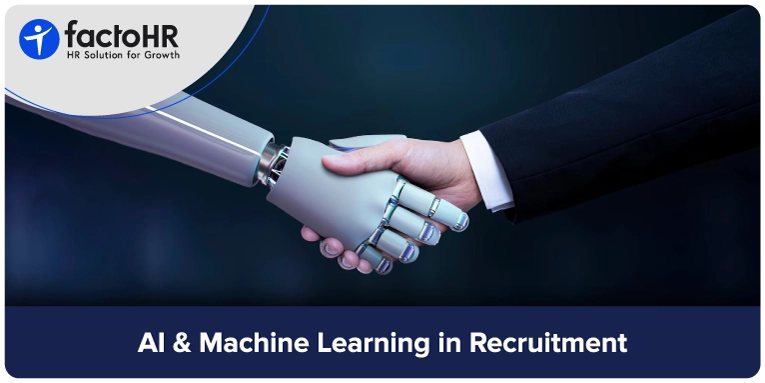AI and Machine Learning in Recruitment

Table of Contents
As business domains change, Human Resource Management (HRM) encounters new obstacles that must be surmounted to ensure optimal growth and development for the organization. AI and ML technologies can provide fresh, creative answers to HRM problems in this situation. HRM increasingly uses these solutions to make better decisions, automate repetitive operations, and boost employee satisfaction. In HRM, AI and Machine Learning in Recruitment have been implemented to achieve better outcomes.
The call for using artificial intelligence to enhance the employment process by automating several functions within the employment process is known as AI for recruitment. The use of AI in the employment process serves as a way of enhancing data analysis for concrete and efficient decision-making among employers. Conversely, a branch of artificial intelligence is machine learning. It focuses on statistical data analysis to enable computer systems to learn without explicit programming.
This article will discuss using AI and ML in an organization’s recruitment process.
What Is AI for Recruitment?
The technique of employing AI in HRM to automate laborious, repetitive operations while providing data insights and customization during the employment process is known as AI recruiting. The science of teaching robots to carry out human-like tasks so that some functions can be automated.
Using AI can open up passive prospects for talent acquisition teams and provide essential data that can help improve decision-making and outcomes, such as increased hiring quality. Recruitment tools must link the right person with the right jobs and talent to the right recruiters to build the right teams for the business.

What Is ML in Recruitment?
One kind of artificial intelligence is machine learning (ML), which uses algorithms to find patterns and forecast outcomes based on past performance. Machine Learning in Recruitment teaches computers to perform manual activities like resume comparison and shortlisting the best prospects.
It employs data-driven insights to assist you in hiring individuals who will complement your company culture and make instructed preferences. It may also be used to enhance the learning and development of employees and speed up the onboarding process in any organization, thus making the hiring process easier for your business and potential employees.
How Can AI Be Used in Recruitment?
Marketing job roles help determine a good time to post a job, suitable sites and boards, and the proper way to write job descriptions to achieve the best results.
Engaging Candidates
Artificial intelligence assistants and automated messaging systems may eliminate the need for human workers to conduct routine dialogues on scheduling and next steps.
Finding Applicants
AI and ML can assist in finding candidates for positions by analyzing web platforms, social media profiles, and professional networks.
Resume Screening
It can be used to review resumes and provide employers with the people they think are the most qualified. Applicant tracking systems frequently come with this resume-scanning feature.
Training and Business Planning
ML allows for tailoring training programs for each individual in a company. It can also identify knowledge gaps and suggest training to address them.
Personalized Outreach
In today’s job market, where employees frequently have many options, crafting effective customized messaging can be particularly beneficial.
Helps in Employee Retention
Employee retention is crucial to minimizing attrition and turnover, even though it isn’t a formal hiring process component. With the help of AI and machine learning in recruitment, managing employee retention rates becomes more manageable.

AI and ML Recruitment Solutions
Candidate Sourcing and Screening
AI-based sourcing tools help recruiters find and connect with suitable candidates more rapidly.
According to a survey report, about 35% to 45% of organizations apply Artificial Intelligence and Machine Learning in recruitment. These tools use algorithms and ML principles to perform many tasks, such as searching for the best candidate for a particular post by sifting through job sites, internal databases, and social media platforms. Some AI-sourcing solutions also provide insights and suggestions to recruiters that help the latter make more rational decisions.
Onboarding and Offboarding
First impressions count in the recruitment and onboarding process. Therefore, it is essential to ensure that new employees are sold on the company and have a pleasant experience. AI solutions help HR teams create perfect and appealing onboarding for new workers. From presenting new hires to the organization and its values to assisting them with their first days on the job, these solutions expedite the onboarding process and provide a smooth and memorable experience for each new employee.
Conducting Interviews
AI and machine learning in recruitment are also incorporated into interviews in organizations. Interviews are vital for selecting employees because a company boss gets firsthand experience with the employee during every interview. Conventional face-to-face interviews may take much time from the recruiter’s side and may be very tiring. Comparably, the interview systems powered by Artificial Intelligence can lessen enormous amounts of human work by automating the interview and leveraging data and analytical tools.
Chatbots
Conversational HR chatbots powered by AI and Machine Learning in Recruitment help people find their ideal jobs faster by providing personalized interactions, engagement, job searching, assessment, and scheduling. Using a master database of information, the chatbot employs both automatic language processing and natural language comprehension to ensure that it understands the intent behind a candidate’s question and provides accurate responses. Recruiters enhance the bot’s capabilities by studying job seekers’ discussions and providing extra responses that address their inquiries.
Automated Interview Management
Interview scheduling helps eliminate or automate the scheduling process of candidates, interviewers, hiring managers, recruiters, or anyone else involved in the recruitment process. This is possible through calendar access and integration with hiring team members, whereby candidates can schedule their interviews conveniently. Once all is done, the interview invitation letter is automatically sent to the candidates.
Effective Insights
Actionable Insights offer fit and engagement scoring, allowing teams to discover new job seekers, uncover existing candidates, tap into cloud-sourced alternatives, understand applicant intent, obtain pipeline trends, and view dynamic sources of talent — alleviating talent leaders’ long-standing concerns about data quality and reliability.
Smart Job Searching
Intelligent Search on a professional site provides accurate and relevant job results to assist individuals in finding suitable employment. Organizations experience low talent conversion rates when their searches return irrelevant and inconclusive results. Instead, the search must be clever enough to recognize the intent and context of a candidate’s query and the link between words. Also known as semantic search, this sort of search functionality attempts to comprehend words in the same manner that a human would.

Challenges in AI recruitment
AI and machine learning in recruitment are potent tools, but proper training is essential to utilize them effectively. These models rely on available data, so the quality, quantity, and representativeness of that data can influence their performance.
Introducing new technologies to an existing team requires patience as they navigate the learning curve. Employing change management best practices is crucial to help recruiters adapt to new methods and fully engage with the tools.
While AI and ML can help identify biases in the hiring process, they can still be influenced by the biases of their creators. It is essential to evaluate these tools to ensure they do not perpetuate existing biases and take precautions to mitigate them.
Balancing AI communications with human engagement is necessary to ensure competent candidates remain active in the hiring process.
AI and ML are poised to transform how businesses identify candidates, review resumes, and hire new staff. To maximize the benefits of new technology, conduct thorough research before selecting a platform and provide comprehensive training to the team before implementation.
Conclusion
In conclusion, using Artificial Intelligence and Machine Learning technology in recruitment and selection procedures has resulted in considerable advancements in Human Resource Management. AI is important for recruitment solutions because it addresses various HR concerns, from time-consuming candidate screening to bias mitigation in decision-making.
AI and Machine Learning in Recruitment are transforming human resource management methods by automating routine tasks, improving decision-making capabilities, and promoting a more inclusive workplace atmosphere. AI and ML have significantly impacted HRM, from speeding up the hiring process and improving candidate sourcing to redefining employee onboarding and development. This is where using a Recruitment Software powered by AI is very useful for your organization.

FAQs
How is AI and Machine Learning in Recruitment Learning Utilized in Recruitment?
It enables recruiters to leverage the power of data to make better judgments. It can be helpful in job postings and other selection processes, such as reviewing resumes and applications, pre-employment evaluations, and predictions on successful candidates and how they will integrate into the organizational culture.
What is Artificial Intelligence Recruitment Software All About?
This recruiting software is a revolutionary tool that uses artificial intelligence and machine learning principles to address and enhance multiple recruitment processes.
Why Is AI Beneficial in Recruitment?
These solutions use potent algorithms and data analytics to automate processes like resume screening, candidate sourcing, and even performing first interviews. One of the primary benefits of these recruiting tools is their ability to evaluate massive amounts of data quickly and effectively.
Is Artificial Intelligence the Future of Recruitment?
Recruitment is one of the fields that has been heavily influenced by artificial intelligence. Applying AI at this stage of the recruitment process is becoming increasingly popular as recruiters adopt these tools. Subsequently, as technology continues to improve, the utilization of AI will be expected to become even more prevalent in the hiring process.
What Constitutes Responsible Usage of AI in Human Resources?
Therefore, ethical AI use in HR is about much more than compliance. It is about building and sustaining trust, creating the best culture, and ensuring that technology is working for the benefit of all employees. As AI evolves, so should our commitment to ethical ideals and responsibility for governance.
Grow your business with factoHR today
Focus on the significant decision-making tasks, transfer all your common repetitive HR tasks to factoHR and see the things falling into their place.

© 2026 Copyright factoHR


